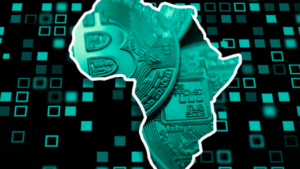- A staggering 99% of South Africans and 98% of Nigerians have heard of cryptocurrencies, surpassing all other countries in the YouGov study on crypto awareness, web3 technologies, and the future of money.
- The YouGov study, conducted between April 26th and May 18th, 2023, reached a diverse pool of respondents across 15 countries.
- A bullish sentiment towards crypto investment prevails in both nations, with 90% of Nigerians and 78% of South Africans expressing their intention to invest in cryptocurrencies over the next 12 months.
In the ever-evolving landscape of the digital age, cryptocurrency and blockchain technology have emerged as transformative forces reshaping economies, finance, and the internet itself. A recent study conducted by YouGov has shed light on the crypto-savvy nature of Nigeria and South Africa, two African nations that have embraced cryptocurrencies with unprecedented enthusiasm. This article explores the study’s findings, delving into crypto awareness, investment sentiment, the future of money, and perceptions of Web3 technologies in these nations.
The YouGov study: A snapshot
The YouGov study, conducted between April 26th and May 18th, 2023, reached out to a diverse pool of respondents across 15 countries, including Argentina, Brazil, France, Germany, India, Indonesia, Japan, Mexico, Nigeria, South Africa, South Korea, The Philippines, the UK, the US, and Vietnam. The survey comprised 32 questions and was meticulously designed to represent each nation’s population. Data collected from the respondents was carefully weighted based on factors such as sex, gender, and region to ensure a true reflection of the national population. Subsequently, the analysis was carried out by YouGov consultants.
Crypto awareness: Nigeria and South Africa lead the pack
The study’s most striking revelation is the remarkably high level of crypto understanding in Nigeria and South Africa. A staggering 99% of South Africans and 98% of Nigerians have heard of cryptocurrencies, surpassing all other countries in the YouGov study on crypto awareness, web3 technologies, and the future of money. This robust awareness sets the stage for a deeper exploration of their crypto engagement.
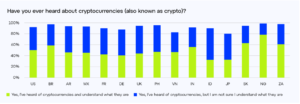
Ownership and investment: Nigeria and South Africa bullish on crypto
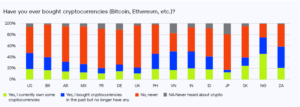
Nigeria and South Africa continue to outshine their global counterparts regarding cryptocurrency ownership. Over 70% of Nigerians surveyed have owned cryptocurrency at some point, while just under 60% of South Africans have done the same. Only Vietnam and India boast ownership figures exceeding 50%. Moreover, a bullish sentiment towards crypto investment prevails in both nations, with 90% of Nigerians and 78% of South Africans expressing their intention to invest in cryptocurrencies over the next 12 months.
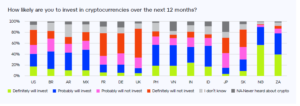
The future of money: A paradigm shift
While the cryptocurrency landscape is witnessing rapid growth, it’s important to note that not everyone shares a utopian vision of a crypto-dominated world. A mere 16% of respondents from the survey believe that cryptocurrencies are the future of money. This suggests that while cryptocurrencies have garnered substantial attention, many still doubt their role in the global financial system.
Global financial system: room for improvement
Interestingly, 65% of survey respondents believe that the global financial system can be improved. This finding underscores the belief in the potential of blockchain technology to bring about positive changes in traditional economic methods. The desire for improvements and alternatives drives the growing interest in cryptocurrencies and related technologies.
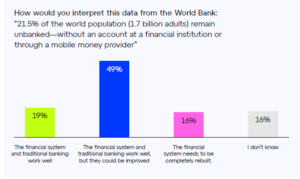
Web3 technologies: The awareness gap
Despite the widespread awareness of cryptocurrencies, the study reveals a significant gap in understanding and awareness regarding Web3 technologies. Web3, which encompasses blockchain-based solutions for digital ownership, identity, and privacy, still needs to be made familiar to the global population. Only 8% of survey respondents consider themselves very familiar with the concept of Web3. Indicating a disconnect between public perceptions and the technology’s transformative potential.
The desire for ownership and data privacy
Paradoxically, while many respondents may not fully grasp the nuances of Web3, they strongly support its core principles and aspirations. Half of the respondents believe that Web3 technologies add value to the Internet. While an overwhelming 67% assert that they should own the content and creations they produce. This sentiment reflects a growing desire to control digital assets and online identity.
Moreover, concerns about data privacy are paramount, with 83% of respondents prioritizing data privacy. A significant majority (70%) believe they should share in the profits companies generate from their data. Furthermore an astonishing 79% express a desire for greater control over their online identities. These findings underscore the importance of bridging the awareness gap. Educating the public about how Web3 technologies can empower users with increased ownership, privacy guarantees, and a share of the profits generated from their online activities.
Regional discrepancies: skepticism vs. enthusiasm
The study highlights stark regional discrepancies in attitudes toward cryptocurrency and Web3 technologies. European nations, Japan and South Korea exhibit more skepticism. They often associate crypto with negative concepts such as scams, money laundering, and speculation. In contrast, countries in Southeast Asia, South America, and Africa generally demonstrate more enthusiastic attitudes. Seeing crypto as a potential future of money and a means to access global capital in regions with unstable local currencies.
From “Users” to “Builders”: a paradigm shift
The YouGov study ultimately points to an encouraging shift in mainstream attitudes toward a vision of the internet that provides more control over the data shared online and more equitable profit-sharing with content creators. However, a significant gap is still needed between awareness of cryptocurrencies and practical understanding and utilization of Web3 technologies.
This disconnect presents a valuable opportunity for mainstream Web3 applications to bridge the gap and address the agency deficit in today’s internet landscape, characterized by limited privacy, control, and ownership. The vision is for internet users to adopt a “builder” mindset. Leveraging Web3 products to solve problems related to online ownership, identity, privacy, and creator monetization.
Conclusion
Nigeria and South Africa are crypto-savvy nations, leading cryptocurrency awareness and engagement. The YouGov study reveals a growing appetite for crypto investment. And a desire for more control over digital assets and online identity. Despite the low awareness of Web3 technologies, there is strong support for their underlying principles of ownership and data privacy.
As the world continues to grapple with the implications of blockchain technology and the internet’s evolution into a more decentralized and user-centric space, the findings of this study emphasize the importance of education and outreach. Bridging the awareness gap and fostering a deeper understanding of web3 technologies is essential to empower individuals to take control of their online presence, protect their data, and participate in the emerging digital economy.
Nigeria and South Africa’s crypto-savvy populations are inspiring examples of the transformative potential of blockchain and Web3 technologies. As more nations and individuals embrace these innovations, the future of the internet may be one where users become builders, shaping a more equitable and secure digital landscape for all.
- SEO Powered Content & PR Distribution. Get Amplified Today.
- PlatoData.Network Vertical Generative Ai. Empower Yourself. Access Here.
- PlatoAiStream. Web3 Intelligence. Knowledge Amplified. Access Here.
- PlatoESG. Automotive / EVs, Carbon, CleanTech, Energy, Environment, Solar, Waste Management. Access Here.
- PlatoHealth. Biotech and Clinical Trials Intelligence. Access Here.
- ChartPrime. Elevate your Trading Game with ChartPrime. Access Here.
- BlockOffsets. Modernizing Environmental Offset Ownership. Access Here.
- Source: https://web3africa.news/2023/09/12/news/nigeria-and-south-africa-leaders-of-the-crypto-and-web3-revolution-in-africa/
- :has
- :is
- :not
- :where
- 12
- 12 months
- 15%
- 179
- 18th
- 2023
- 26th
- 32
- a
- About
- access
- across
- activities
- add
- address
- adopt
- africa
- African
- age
- agency
- All
- alternatives
- america
- an
- analysis
- and
- appetite
- applications
- April
- ARE
- Argentina
- article
- AS
- asia
- Assets
- Associate
- At
- attention
- awareness
- based
- BE
- become
- belief
- believe
- between
- blockchain
- blockchain and web3
- blockchain technology
- blockchain-based
- blockchain-based solutions
- both
- Brazil
- BRIDGE
- bridging
- bring
- builders
- Bullish
- by
- CAN
- capital
- carefully
- carried
- Changes
- characterized
- Companies
- Comprised
- concept
- concepts
- Concerns
- conducted
- Consider
- consultants
- content
- content creators
- continue
- continues
- contrast
- control
- Core
- countries
- creations
- creator
- creators
- crypto
- Crypto Investment
- cryptocurrencies
- cryptocurrency
- currencies
- data
- data privacy
- decentralized
- deeper
- DEFICIT
- demonstrate
- designed
- desire
- Despite
- digital
- digital age
- Digital Assets
- Digital economy
- digital ownership
- diverse
- done
- doubt
- drives
- each
- Economic
- economies
- economy
- educating
- Education
- Education and outreach
- embrace
- embraced
- emerged
- emerging
- emphasize
- empower
- encompasses
- encouraging
- engagement
- ensure
- enthusiasm
- enthusiastic
- equitable
- essential
- European
- everyone
- evolution
- examples
- exceeding
- exhibit
- exploration
- explores
- express
- factors
- familiar
- Figures
- finance
- financial
- financial system
- finding
- findings
- For
- Forces
- fostering
- France
- from
- fully
- Furthermore
- future
- Future of Money
- gap
- Gender
- generally
- generate
- generated
- Germany
- Global
- global financial
- global financial system
- grasp
- greater
- Growing
- growing interest
- Growth
- guarantees
- Half
- Have
- heard
- High
- highlights
- How
- However
- HTTPS
- identities
- Identity
- implications
- importance
- important
- improved
- improvements
- in
- Including
- increased
- india
- individuals
- Indonesia
- innovations
- inspiring
- Intention
- interest
- Internet
- into
- Invest
- investment
- ITS
- itself
- Japan
- just
- korea
- landscape
- Laundering
- lead
- leaders
- leading
- Level
- leveraging
- light
- Limited
- local
- Low
- made
- Mainstream
- Majority
- many
- max-width
- May..
- means
- mere
- methods
- meticulously
- Mexico
- Mindset
- monetization
- money
- Money Laundering
- months
- more
- Moreover
- most
- National
- Nations
- Nature
- needed
- needs
- negative
- news
- next
- Nigeria
- of
- often
- on
- ONE
- online
- only
- Opportunity
- Other
- out
- outreach
- over
- overwhelming
- own
- owned
- ownership
- paradigm
- Paramount
- participate
- Philippines
- plato
- Plato Data Intelligence
- PlatoData
- Point
- points
- pool
- population
- populations
- positive
- potential
- potential of blockchain
- Practical
- presence
- presents
- principles
- prioritizing
- privacy
- problems
- produce
- Products
- profits
- protect
- provides
- public
- Questions
- rapid
- reached
- recent
- reflection
- reflects
- regarding
- region
- regional
- regions
- related
- represent
- respondents
- Reveals
- revelation
- Revolution
- robust
- Role
- Room
- same
- scams
- secure
- seeing
- sentiment
- Sets
- Sex
- shaping
- Share
- shared
- Shares
- shed
- shift
- should
- significant
- Skepticism
- Solutions
- SOLVE
- some
- South
- South Africa
- South America
- South Korea
- southeast
- Southeast Asia
- Space
- speculation
- Stage
- stark
- Still
- strong
- strongly
- Study
- Subsequently
- substantial
- such
- Suggests
- support
- Survey
- surveyed
- system
- Take
- Technologies
- Technology
- that
- The
- The Future
- The Philippines
- the UK
- the world
- their
- themselves
- There.
- These
- they
- this
- to
- today’s
- toward
- towards
- traditional
- transformative
- true
- two
- Uk
- Ultimately
- under
- underlying
- underscores
- understanding
- unprecedented
- us
- user-centric
- users
- Valuable
- value
- very
- Vietnam
- vision
- vs
- was
- Web3
- web3 applications
- Web3 Revolution
- web3 technologies
- Web3africa
- which
- while
- widespread
- with
- witnessing
- world
- zephyrnet


